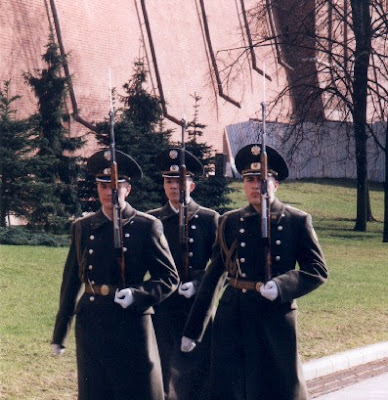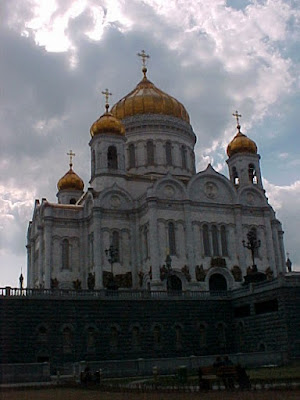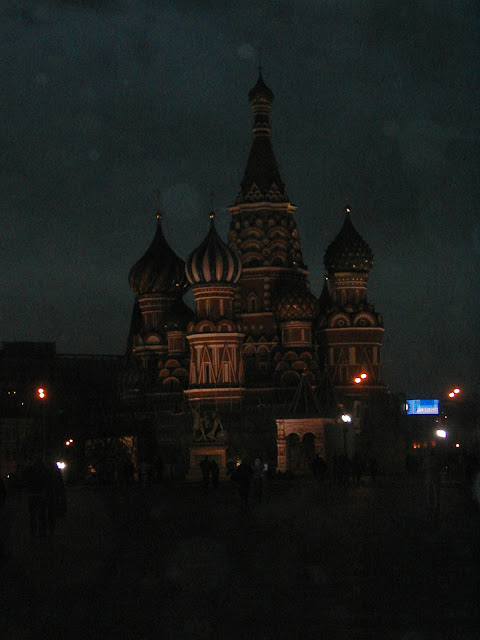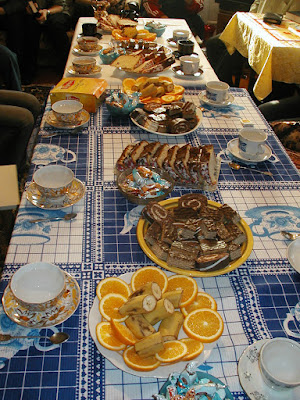It is hard for me to imagine a visit to Russia from the vantage point of 2023. Our missions trip in 2004 came during a period of what appeared to be warming relations between the Russian Federation and western Europe and the US. Putin had already assumed command of the Russian state. Despite the fact that his government was waging war in Chechnya, there were no clear signs to us, as ordinary Americans, that things would deteriorate. Those of us who were old enough to remember the old Soviet days were more concerned about vestiges of Soviet era concerns than we were about new threats, fears, and restrictions yet to develop.
We were happy as a group that we had completed the tasks of friendship-making that had been our primary mission. Our attention on that last day of our tour in Russia in 2004 was on what and how much we could see of Moscow in a few hours on an April afternoon.So, a question: suppose you had a few hours of a single afternoon to tour Paris, what would you choose to see? Likely you would choose well known landmarks, those you know from photographs -- Notre Dame, for example, and the Eiffel Tower. In London, you might choose St. Paul's Cathedral, Westminster Abbey, and Buckingham Palace. In Moscow the tourist magnet is, naturally, Red Square and the architecturally stunning buildings around it, beginning with St. Basil's and the Kremlin itself. Fortunately for us at the end of our short visit, many of the places we knew about either bordered Red Square or were within walking distance.
And what a way to crown our quick trip to Russia! The marvels around Red Square are wonderful in photographs. But in person they are seriously stunning, engrossing, provocative. St. Basil's Cathedral, much photographed and deservedly famous, is riveting from any angle. Every feature of that church, of course, displays multiple, complex layers of spiritual and historical significance.
Scale is impressive everywhere in Russia, and Red Square itself is no exception -- it is huge. The older members of our fathers and sons group remembered Red Square from black and white television programs in the 1950s and 1960s. often featuring Nikita Khrushchev and the Communist Party inner circle standing atop the Kremlin wall. May Day parades especially featured military hardware -- tanks, missiles, and ranks of soldiers marching. Those demonstrations of military might required both space and a solid surface of cobblestones.
The Iberian Gate (also called the Resurrection gate, below) with its little green chapel was torn down in 1931 to allow room for the heavy military equipment on display. The twin gates and the little chapel were rebuild in 1994-95 after the dissolution of the Soviet Union.
Along one side of Red Square is the Kremlin wall and gate, which were originally wooden fortifications built in the 12th Century. It was built on high ground at the confluence of two rivers, a strategic location at the center of the city. Muscovites could find protection within the walls from invaders. Protection from invasion were frequently noted to explain various historical events; and the presence of walls, gates, and fortifications here as in Vladimir bore witness to the very real fear of foreign invasion.
For the last hundred years at least, the term "Kremlin" has been synonymous with the seat of government, first for the Soviet Union and now for the Russian Federation. And while the very recent "advance" toward Moscow by the mercenary Wagner military forces would have been unlikely to reach the Kremlin without serious fighting, it is easy for me to imagine how age-old fears might have been stirred up.
Fortifications help explain my sense that we were never far from a military presence. Another deep impression I could not avoid was spiritual. As famous as St. Basil's may be for its unique architecture, it is only one of a number of churches around Red Square that testify to the close relationship between the Russian people and Christianity. The Church of the Assumption, also bordering Red Square, is known, at least to tourists, as "the pink church." Like nearly all churches in Russia, those around Red Square were closed during the Soviet era. Some were given over to other purposes and some became museums. Since the collapse of the USSR, religion has regained legal status and some closed churches, though clearly not all, have reopened.
We were not able to enter any of the buildings, churches or otherwise, but all of them contain treasures of cultural, artistic, and religious artifacts of incalculable value.
While the military presence was not as visible as we might have expected, it was never far away. Perhaps most of the military presence remained out of sight. But there were armed soldiers standing guard at the eternal flame near the tomb of the unknown soldier and at Lenin's mausoleum, both at the base of the Kremlin wall. The mausoleum (the squarish building above) was closed for periodic "restoration" of Lenin's body, which had been lying in state since his death in 1924. Had it been open on the day of our visit, some of us would likely have wanted to wait in line for a viewing. We were told that on days when visiting was possible, the wait to enter could be extremely long. A group of off duty soldiers who happened to be touring the sights at Red Square were happy to pose for a photograph, not far from where our group had posed. Here too it would have been interesting to know whether these soldiers had been or were likely to be deployed to Chechnya. It is fair to say that none in our group had been aware of the fighting in Chechnya before our trip. And certainly no one -- that is, no Russian -- ever mentioned or commented on it.
Seeing them with a father's eyes and being aware of how young men were being drafted into service for the war effort, I was impressed with how young the soldiers all looked.
Behind the soldiers, just to the left, is Lenin's mausoleum. And the huge red building just to the right (also below) is State Historical Museum, which would have been a serious contender for my attention had it been open.
Not on Red Square but nearby is the theater where the famous Bolshoi Ballet Company performs in Moscow.
With more time to visit these sites, we might have asked about tickets to see the Bolshoi Company perform and to marvel at the interior of this building.
A lot of these photographs seem remote to me after nearly twenty years. It has been difficult at times to reconstruct various elements of our touring experience. That said, I am certain that we would make a mistake to suggest that the heart and soul of ordinary Russians is reflected in the actions of their government. I have found this disjunction to be true in all the countries I have visited, especially in those where government actions are not held accountable through the courts and through elections.
I am certain as well that war is always tragic and nearly always unnecessary. As I finish writing this post in July 2023, news has reached us that a Russian missile has hit and badly damaged the Transfiguration Cathedral in Odessa, Ukraine. How this targeting of an ancient Orthodox church is related to the Russian military's strategic interests remains unclear. But I can only hope that, whatever his reasoning, Mr. Putin's actions have not put targets on the historic gems in his own front yard.



















































